后面加ing的动词
动词后加-ing的规则

动词后加-ing的规则1.英语动词加-ing,通常是在原形词尾直接加-ing构成:cough—coughing,climb—climbing,stand—standing,fight—fighting2.以-e结尾的动词(1)如果动词原形以一辅音加一不发音的-e结尾,一般应去掉e再加ing:write—writing,hope—hoping,care—caring,stare—staring,plane—planing,have—having,save—saving,produce—producing, breathe—breathing(2)以-ie结尾的动词应先将e去掉,将i变成y然后再加-ing:die—dying,tie—tying,vie—vying,lie—lying(3)以-ee,-oe,-ye结尾的动词加-ing时应保留词尾e:see—seeing,flee—fleeing,free—freeing,agree—agreeing,hoe—hoeing, dye—dyeing,eye—eyeing (4)以-ue结尾的动词大多应先去e再加-ing:sue—suing,imbue—imbuing,construe—construing,pursue—pursuing,rue—ruing有时,词尾e可去掉也可保留:glue—gluing或 glueing,cue—cuing或 cueing, blue—blueing或 bluing,true—truing或trueing,clue—clueing或cluing3.以一元音加一辅音结尾的动词(1)如果动词最后一音节为重读闭音节,最后一个字母需要重复:run—running, stop—stopping, hop—hopping, plan—planning,star—starring, control—controlling但辅音x是个例外,无需重复(x其实起着两个辅音的作用):tax—taxing,relax—relaxing(2)如果动词最后一个音节为次重读音节,最后一个字母有时也重复:kidnap—kidnapping或kidnaping,program—programming或programing(3)如果动词最后一个音节为非重读音节,最后一个字母大多无需重复:open—opening,offer—offering,audit—auditing但在有些动词中,重复或不重复均可:worship—worshiping或 worshipping,focus—focusing或focussing,cancel—canceling或cancelling,travel—traveling或travelling以非重读的-el结尾的动词加-ing时,英国英语习惯于重复词尾l,而美国英语则习惯于不重复1。
英语动词加ing
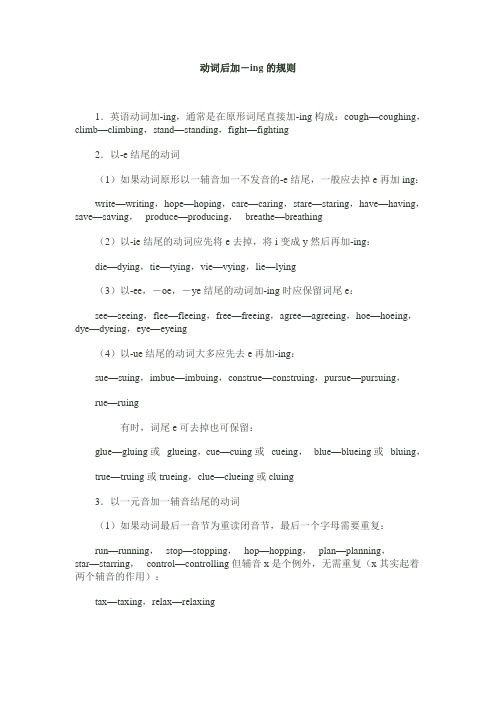
动词后加-ing的规则1.英语动词加-ing,通常是在原形词尾直接加-ing构成:cough—coughing,climb—climbing,stand—standing,fight—fighting2.以-e结尾的动词(1)如果动词原形以一辅音加一不发音的-e结尾,一般应去掉e再加ing:write—writing,hope—hoping,care—caring,stare—staring,have—having,save—saving,produce—producing,breathe—breathing(2)以-ie结尾的动词应先将e去掉,将i变成y然后再加-ing:die—dying,tie—tying,vie—vying,lie—lying(3)以-ee,-oe,-ye结尾的动词加-ing时应保留词尾e:see—seeing,flee—fleeing,free—freeing,agree—agreeing,hoe—hoeing,dye—dyeing,eye—eyeing(4)以-ue结尾的动词大多应先去e再加-ing:sue—suing,imbue—imbuing,construe—construing,pursue—pursuing,rue—ruing有时,词尾e可去掉也可保留:glue—gluing或glueing,cue—cuing或cueing,blue—blueing或bluing,true—truing或trueing,clue—clueing或cluing3.以一元音加一辅音结尾的动词(1)如果动词最后一音节为重读闭音节,最后一个字母需要重复:run—running,stop—stopping,hop—hopping,plan—planning,star—starring,control—controlling但辅音x是个例外,无需重复(x其实起着两个辅音的作用):tax—taxing,relax—relaxing(2)如果动词最后一个音节为次重读音节,最后一个字母有时也重复:kidnap—kidnapping或kidnaping,program—programming或programing(3)如果动词最后一个音节为非重读音节,最后一个字母大多无需重复:open—opening,offer—offering,audit—auditing但在有些动词中,重复或不重复均可:worship—worshiping或worshipping,focus—focusing或focussing,cancel—canceling或cancelling,travel—traveling或travelling以非重读的-el结尾的动词加-ing时,英国英语习惯于重复词尾l,而美国英语则习惯于不重复1。
动词加ing的规则

动词加ing的规则
动词+ing的规则是:
1. 一般情况下,动词加-ing直接在动词的末尾加上-ing。
例如:run(跑)→ running(跑着)
2. 以不发音的字母e结尾的动词,在加-ing时,需去掉字母e再加上-ing。
例如:take(拿)→ taking(拿着)
3. 以重读闭音节结尾,并且结尾只有一个辅音字母的动词,双写这个辅音字母,再加-ing。
例如:stop(停止)→ stopping(停止着)
4. 以一个元音字母(除了e)结尾,并且结尾只有一个辅音字母的动词,双写这个辅音字母,再加-ing。
例如:sit(坐)→ sitting(坐着)
5. 以“辅音字母+元音字母+辅音字母”结尾的动词,重读最后一个音节,双写最后一个辅音字母,再加-ing。
例如:get(得到)→ getting(得到着)
6. 以"ie"结尾的动词,将"ie"变成"y"再加-ing。
例如:lie(躺)→ lying(躺着)
需要注意的是,这只是动词加-ing的一些一般规则,部分动词可能会有特殊情况,需要根据具体内容进行考虑和判断。
动词后加ing的规则

动词后加i n g的规则文件管理序列号:[K8UY-K9IO69-O6M243-OL889-F88688]动词后加-i n g的规则1.英语动词加-ing,通常是在原形词尾直接加-ing构成:cough—coughing,climb—climbing,stand—standing,fight—fighting 2.以-e结尾的动词(1)如果动词原形以一辅音加一不发音的-e结尾,一般应去掉e再加ing:write—writing,hope—hoping,care—caring,stare—staring,plane—planing,have—having,save—saving, produce—producing, breathe—breathing(2)以-ie结尾的动词应先将e去掉,将i变成y然后再加-ing:die—dying,tie—tying,vie—vying,lie—lying(3)以-ee,-oe,-ye结尾的动词加-ing时应保留词尾e:see—seeing,flee—fleeing,free—freeing,agree—agreeing,hoe —hoeing, dye—dyeing,eye—eyeing(4)以-ue结尾的动词大多应先去e再加-ing:sue—suing,imbue—imbuing,construe—construing,pursue—pursuing,rue—ruing有时,词尾e可去掉也可保留:glue—gluing或 glueing,cue—cuing或 cueing, blue—blueing或bluing,true—truing或trueing,clue—clueing或cluing3.以一元音加一辅音结尾的动词(1)如果动词最后一音节为重读闭音节,最后一个字母需要重复:run—running, stop—stopping, hop—hopping, plan—planning,star—starring, control—controlling但辅音x是个例外,无需重复(x其实起着两个辅音的作用):tax—taxing,relax—relaxing(2)如果动词最后一个音节为次重读音节,最后一个字母有时也重复:kidnap—kidnapping或kidnaping,program—programming或programing(3)如果动词最后一个音节为非重读音节,最后一个字母大多无需重复:open—opening,offer—offering,audit—auditing但在有些动词中,重复或不重复均可:worship—worshiping或 worshipping,focus—focusing或focussing,cancel—canceling或cancelling,travel—traveling或travelling以非重读的-el结尾的动词加-ing时,英国英语习惯于重复词尾l,而美国英语则习惯于不重复1。
动词后加ing的规则
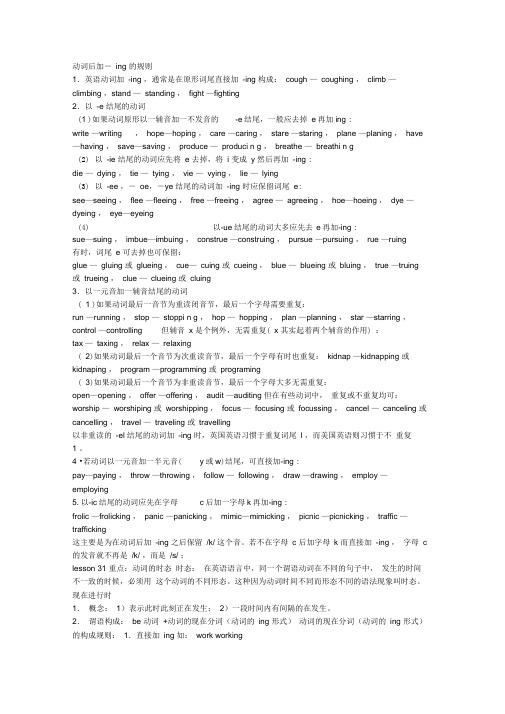
动词后加-ing 的规则1.英语动词加-ing ,通常是在原形词尾直接加-ing 构成:cough —coughing ,climb —climbing ,stand —standing ,fight —fighting2.以-e 结尾的动词(1 )如果动词原形以一辅音加一不发音的-e结尾,一般应去掉e再加ing :write —writing ,hope—hoping ,care —caring ,stare —staring ,plane —planing ,have —having ,save—saving ,produce —produci n g ,breathe —breathi n g(2)以-ie 结尾的动词应先将 e 去掉,将i 变成y 然后再加-ing :die —dying ,tie —tying ,vie —vying ,lie —lying(3)以-ee ,-oe,-ye 结尾的动词加-ing 时应保留词尾e:see—seeing ,flee —fleeing ,free —freeing ,agree —agreeing ,hoe—hoeing ,dye —dyeing ,eye—eyeing(4)以-ue结尾的动词大多应先去e再加-ing :sue—suing ,imbue—imbuing ,construe —construing ,pursue —pursuing ,rue —ruing有时,词尾 e 可去掉也可保留:glue —gluing 或glueing ,cue—cuing 或cueing ,blue —blueing 或bluing ,true —truing 或trueing ,clue —clueing 或cluing3.以一元音加一辅音结尾的动词( 1 )如果动词最后一音节为重读闭音节,最后一个字母需要重复:run —running ,stop —stoppi n g ,hop —hopping ,plan —planning ,star —starring ,control —controlling 但辅音x 是个例外,无需重复( x 其实起着两个辅音的作用) :tax —taxing ,relax —relaxing( 2)如果动词最后一个音节为次重读音节,最后一个字母有时也重复:kidnap —kidnapping 或kidnaping ,program —programming 或programing( 3)如果动词最后一个音节为非重读音节,最后一个字母大多无需重复:open—opening ,offer —offering ,audit —auditing 但在有些动词中,重复或不重复均可:worship —worshiping 或worshipping ,focus —focusing 或focussing ,cancel —canceling 或cancelling ,travel —traveling 或travelling以非重读的-el 结尾的动词加-ing 时,英国英语习惯于重复词尾l ,而美国英语则习惯于不重复1 。
后面要跟 ing 的动词有哪些

Unit 1
23) 无法忍受做某事 can’t stand doing sth 24)考虑做什么事情 consider doing sth 25 be busy doing 忙于做某事
Unit 1
23) like to do =like doing 24) start doing sth =start to do 25.begin to do= begin doing
Unit 1
23) stop
to do 停下来去做某事
Unit 1
24) stop doing 停止做某事 25. forget to do忘记去做某事 26. forget doing 忘记做过某事 27.Remember to do 记得去做某事 28.Remember doing 记得做过某事
Unit 1
13) 阻止某人做某事 prevent sb from doing, stop sb from doing 14) 喜欢做A胜过做B prefer doing A to doing B, 15) 做完某事 finish+do ing 16) 介意做某事 mind+ doing 17) 喜欢做某事 enjoy+do ing 18) 坚持做某事, 不停地做某事 keep+ doing 19) 建议做某事 suggest doing 20) 情不自禁地做 can’t help doing 21) 想要做某事 feel like doing = want to do , would like to do sth 22) remember doing sth 记得做过某事
各位同仁, 如果发现还有别的, 请马上通知大家哦。 zhu
1) 2) 3ng sth, have some difficulty doing have some problems doing sth 干…事情有乐趣 have fun doing sth, have a good time doing 5) 以做…而结束 end up doing 6) 推迟做…. put off doing sth
后面可以跟ing形式的动词
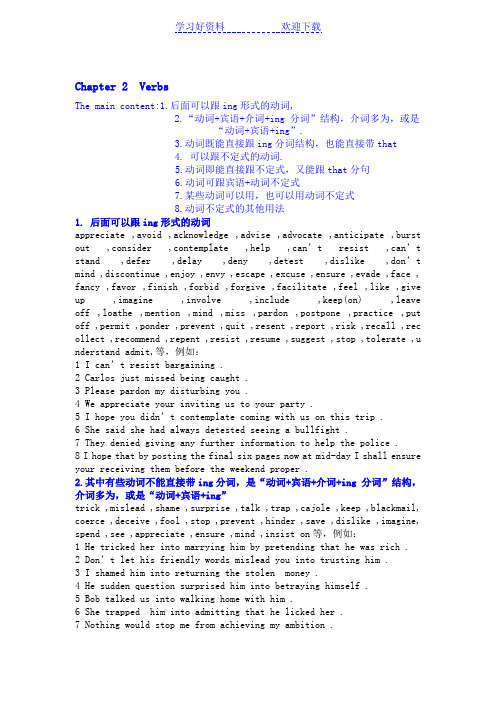
Chapter 2 VerbsThe main content:1.后面可以跟ing形式的动词,2.“动词+宾语+介词+ing 分词”结构,介词多为,或是“动词+宾语+ing”.3.动词既能直接跟ing分词结构,也能直接带that4. 可以跟不定式的动词.5.动词即能直接跟不定式,又能跟that分句6.动词可跟宾语+动词不定式7.某些动词可以用,也可以用动词不定式8.动词不定式的其他用法1. 后面可以跟ing形式的动词appreciate ,avoid ,acknowledge ,advise ,advocate ,anticipate ,burst out ,consider ,contemplate ,help ,can’t resist ,can’t stand ,defer ,delay ,deny ,detest ,dislike ,don’t mind ,discontinue ,enjoy ,envy ,escape ,excuse ,ensure ,evade ,face , fancy ,favor ,finish ,forbid ,forgive ,facilitate ,feel ,like ,give up ,imagine ,involve ,include ,keep(on) ,leave off ,loathe ,mention ,mind ,miss ,pardon ,postpone ,practice ,put off ,permit ,ponder ,prevent ,quit ,resent ,report ,risk ,recall ,rec ollect ,recommend ,repent ,resist ,resume ,suggest ,stop ,tolerate ,u nderstand admit,等,例如:1 I can’t resist bargaining .2 Carlos just missed being caught .3 Please pardon my disturbing you .4 We appreciate your inviting us to your party .5 I hope you didn’t contemplate coming with us on this trip .6 She said she had always detested seeing a bullfight .7 They denied giving any further information to help the police .8 I hope that by posting the final six pages now at mid-day I shall ensure your receiving them before the weekend proper .2.其中有些动词不能直接带ing分词,是“动词+宾语+介词+ing 分词”结构,介词多为,或是“动词+宾语+ing”trick ,mislead ,shame ,surprise ,talk ,trap ,cajole ,keep ,blackmail, coerce ,deceive ,fool ,stop ,prevent ,hinder ,save ,dislike ,imagine, spend ,see ,appreciate ,ensure ,mind ,insist on等,例如:1 He tricked her into marrying him by pretending that he was rich .2 Do n’t let his friendly words mislead you into trusting him .3 I shamed him into returning the stolen money .4 He sudden question surprised him into betraying himself .5 Bob talked us into walking home with him .6 She trapped him into admitting that he licked her .7 Nothing would stop me from achieving my ambition .8 There was nothing to prevent her from doing so .9 What kept you from joining me ?10 Don’t let me hinder you from doing .11 He could hardly restrain himself from shouting aloud .12 A sailor saved him from drawing .13 I dislike people telling me what to think.14 I can’t imagine him working in an office .15 Would you rather spend time gardening or spend money paying somebody to do it for you ?16 Did you see her talking to the postman ?3.有些动词既能直接跟ing分词结构,也能直接带thatacknowledge ,admit ,advocate ,anticipate ,appreciate ,deny ,fancy ,im agine ,suggest ,mean(entail) ,mention ,propose ,recall ,recollect ,un derstand1 The watchman reported finding the door open .or The watchman reported that he had found the door open .2 He anticipated getting much pleasure from the reading of that book . or He anticipated that he would get much pleasure from the reading of that book .4.下面可以跟不定式的动词agree ,aim ,apply ,arrange ,advise ,allow ,afford ,appear ,ask , attempt,bear ,begin ,continue ,choose ,claim ,beg ,care ,consent , contrive ,dare,decide ,decline ,demand ,deserve,desire,determine ,exp ect,fail,fear,forbid,forget,go,go on ,guarantee ,help ,hesitate ,hope ,hate ,hear ,learn ,intend ,lick , pledge,plot,neglect,pray,prepare,long,happen ,manage ,mean ,pretend , promise ,prefer ,permit ,propose ,refuse ,resolve ,regret ,remember , seek ,swear ,see ,start ,stop ,think ,try ,watch ,undertake ,seem ,ve nture ,trouble ,volunteer ,vow ,want ,wish等,例如:1 We must agree to differ .2 I aim to finish it tomorrow .3 Last year he applied to retire .4 I have arranged to see them tomorrow morning .5 She chose to go and teach in the countryside .6 He claimed to be the owner of the car .7 He demanded to be told everything .8 We always desire to line in pace with our neighbors9 I determined to be bold and tell the truth .10 He hope to visit France this year .11 You ought to learn to be patient .12 They pledged to learn from each other .13 They are busy preparing to take the final examination .14 We mustn’t pretend to know what we don’t know .15 I don’t profess to know anything about poetry .16 They sought to punish him for his crime ,but he escape .17 He snore to tell the truth .18 The rascal threatened to kill Larry .19 Hamlet vowed to revenge his dead father .5.有些动词即能直接跟不定式,又能跟that分句agree ,arrange ,promise ,resolve ,claim ,decide ,hope ,demand ,determ ine ,pretend ,profess ,swear ,threaten1 We agreed to start early .or we agreed that we should start early .2 I hope to be able to come .or I hope that I will be able to come .6.有些动词可跟宾语+动词不定式advise ,allow ,ask ,(can’t)bear ,beg ,cause ,compel ,command ,encour age ,expect ,forbid ,force ,get ,hate ,help ,instruct ,intend ,invite ,leave ,like ,love ,mean ,need ,oblige ,order ,permit ,persuade ,pre fer ,remind ,recommend ,request ,teach ,tell tempt ,trouble ,want ,warn ,wish ,feel hear ,watch ,let ,make ,get ,have ,arrange for ,ask for ,rely on ,consider ,find ,7.某些动词可以用,也可以用动词不定式advise ,allow ,can’t ,bear ,begin ,continue ,forbid ,forget ,go ,go on ,hate ,intend ,like ,lone ,permit ,prefer ,propose ,regret ,rememb er ,see ,start ,stop ,try ,watch8.动词不定式的其他用法1 表示个人在旅程或任务的结尾所发现或得出的事I arrived home to find that the house had been burgled .可在动词不定式前面加only来强调惊讶和失望的意思After driving all night we got to Amy’s place ,only to discover that she was away .2 动词不定式see和hear可用来解释获得错误和印象的原因,这类动词不定式结构通常跟you’d think或一个类似的词组To see him walk down the street ,you’d never know he was blind .看着他顺着大街走去,你绝不会知道他是个盲人。
动词后加ing的规则
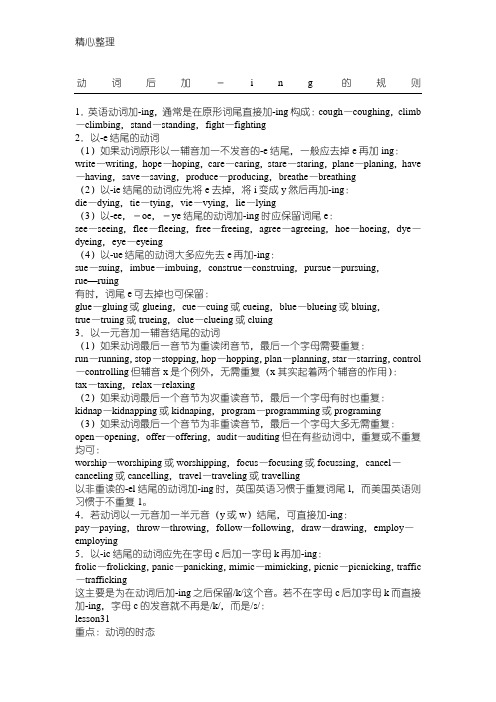
动词后加-i n g的规则1.英语动词加-ing,通常是在原形词尾直接加-ing构成:cough—coughing,climb—climbing,stand—standing,fight—fighting2.以-e结尾的动词(1)如果动词原形以一辅音加一不发音的-e结尾,一般应去掉e再加ing:write—writing,hope—hoping,care—caring,stare—staring,plane—planing,have—having,save—saving,produce—producing,breathe—breathing以非重读的-el结尾的动词加-ing时,英国英语习惯于重复词尾l,而美国英语则习惯于不重复1。
4.若动词以一元音加一半元音(y或w)结尾,可直接加-ing:pay—paying,throw—throwing,follow—following,draw—drawing,employ —employing5.以-ic结尾的动词应先在字母c后加一字母k再加-ing:frolic—frolicking,panic—panicking,mimic—mimicking,picnic—picnicking,traffic—trafficking这主要是为在动词后加-ing之后保留/k/这个音。
若不在字母c后加字母k而直接加-ing,字母c的发音就不再是/k/,而是/s/:lesson31重点:动词的时态时态:在英语语言中,同一个谓语动词在不同的句子中,发生的时间不一致的时候,必须用这个动词的不同形态。
这种因为动词时间不同而形态不同的语法现象叫时态。
现在进行时1.概念:1)表示此时此刻正在发生;2)一段时间内有间隔的在发生。
2.谓语构成:be动词+动词的现在分词(动词的ing形式)动词的现在分词(动词的ing形式)的构成规则:1.直接加ing如:workworking。
动词后加ing

一动词加-ing 的情况consider, suggest/advise,look forward to,excuse/pardon admit,delay/put off, fancyavoid,miss,keep/keep on,practisedeny,finish,enjoy/appreciate forbid,imag ine,riskcan't help,mind,allow/permit,e scape考虑建议盼原谅, 承认推迟没得想. 避免错过继续练, 否认完成就欣赏. 禁止想象才冒险, 不禁介意准逃亡.如:建议:advise,suggest,冒险:risk,献身:devote oneself to二动词后加doing 和加to do sth. 意思不一样的情况①remember doing指记住过去做过的事,remember to do指记住将来要做的事,表示“不要忘记”。
②forget doing表示忘记过去做过的事,forget to do表示“没有想起做某事”。
③mean doing表示“意味着做某事”,mean to do表示“打算做某事”。
④regret doing表示对已做过的事感到后悔,regret to do表示对将要做的事表示遗憾。
⑤stop doing表示“停止做某事”,stop to do是停止做正在做的事以便去做另外一件事,这里的to do 不是stop的宾语而是stop的目的状语。
⑥try doing表示“尝试做某事”,try to do表示“设法、试图做某事”。
⑦go on doing表示继续做同一件事,go on to do表示做完一件事后,接下去做另外一件事三动词后加to do sth.afford负担得起agree同意appear似乎,显得arrange安排ask问attempt企图beg请求begin开始choose选择claim要求decide决定demand要求desire愿望determine决定expect期望fail不能forget忘记happen碰巧hate憎恨,厌恶hesitate犹豫hope 希望intend想要learn学习long渴望love爱manage设法mean意欲,打算need需要neglect忽视offer提供omit忽略,漏other扰乱;烦恼plan计划prefer喜欢,宁愿prepare准备pretend假装promise承诺,允许refuse拒绝regret抱歉,遗憾seek找,寻觅start开始try试图volunteer志愿want想要wish希望四动词后加sb to do sth. (即:v.+sb/sth+to do):advise劝告allow允许ask要求,邀请beg请求cause引起command命令direct指导drive驱赶enable使能够encourage鼓励entitle有资格forbid禁止force强迫get请,得到hate憎恶help帮助inspire鼓舞instruct指示intend想要,企图invite吸引,邀请lead引起,使得leave 使,让like喜欢mean意欲,打算need需要oblige不得不order命令permit允许prefer喜欢,宁愿prompt促使pronounce断定recommend劝告,推荐remind提醒request 请求require要求teach 教tell告诉tempt劝诱train训练urge激励,力说want想要warn告诫wish 希望五Allow sb to do \allow doin g Advise sb to do \advis e doing六to 为介词的用法to 后加doing sth.be / get / become used to 习惯于be given to 喜欢;癖好be related to 与…有关系be addicted to 沉溺于;对…上瘾be opposed to 反对devote oneself to献身于;专心于be devoted to 致力于;忠诚于be admitted to 被…录取;准进入be reduced to 沦为reduce…to…使…沦为be attached to附属于;喜欢;依恋be adjusted to 适应be known to 为…所知be married to 和…结婚be sentenced to被判处be connected to 和…连在一起be exposed to 暴露于;遭受be compared to 被比喻成compare…to…把…比作…be engaged to 与…订婚be / become / get accustom ed to // accustomed to 惯于;有…习惯be engaged to 与…订婚get down to 着手做lead to 导致object to反对;不喜欢;不赞成put one’s mind to全神贯注于give rise to 引起look forward to 盼望stick to 坚持pay attention to 注意attend to 专心;注意;照料see to 负责;注意contribute to对…作贡献;有助于make contributions to对…作贡献apply oneself to 致力于come close to几乎;将近reply to 回答add to 增加。
动词后加-ing的规则

动词后加-ing的规则动词后加-ing的规则1.英语动词加-ing,通常是在原形词尾直接加-ing构成:cough—coughing,climb—climbing,stand—standing,fight—fighting2.以-e结尾的动词(1)如果动词原形以一辅音加一不发音的-e结尾,一般应去掉e再加ing:write—writing,hope—hoping,care—caring,stare—staring,plane—planing,have—having,save—saving,produce—producing, breathe—breathing(2)以-ie结尾的动词应先将e去掉,将i变成y然后再加-ing:die—dying,tie—tying,vie—vying,lie—lying(3)以-ee,-oe,-ye结尾的动词加-ing时应保留词尾e:see—seeing,flee—fleeing,free—freeing,agree—agreeing,hoe—hoeing, dye—dyeing,eye—eyeing (4)以-ue结尾的动词大多应先去e再加-ing:(3)如果动词最后一个音节为非重读音节,最后一个字母大多无需重复:open—opening,offer—offering,audit—auditing但在有些动词中,重复或不重复均可:worship—worshiping或 worshipping,focus—focusing或focussing,cancel—canceling或cancelling,travel—traveling 或travelling以非重读的-el结尾的动词加-ing时,英国英语习惯于重复词尾l,而美国英语则习惯于不重复1。
4.若动词以一元音加一半元音(y或w)结尾,可直接加-ing:pay—paying, throw—throwing,follow—following,draw—drawing, employ—employing5.以-ic结尾的动词应先在字母c后加一字母k再加-ing:frolic—frolicking,panic—panicking,mimic—mimicking,picnic—picnicking,traffic—trafficking这主要是为在动词后加-ing之后保留/k/这个音。
动词后加ing规则
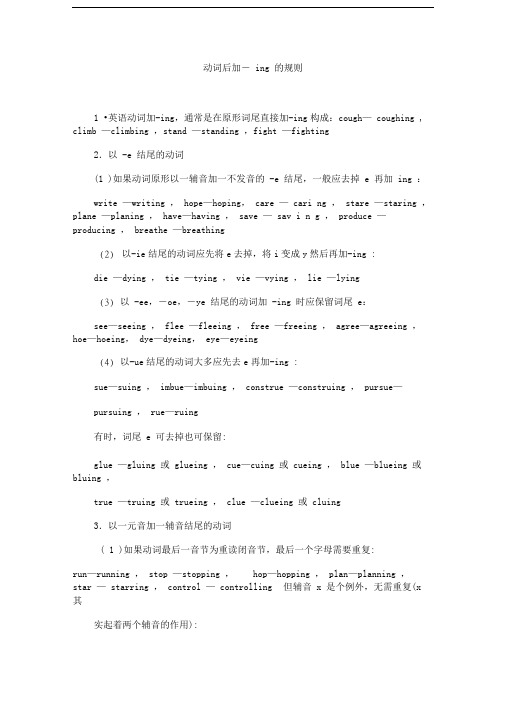
动词后加- ing 的规则1 •英语动词加-ing,通常是在原形词尾直接加-ing构成:cough— coughing , climb —climbing ,stand —standing ,fight —fighting2.以 -e 结尾的动词(1 )如果动词原形以一辅音加一不发音的 -e 结尾,一般应去掉 e 再加 ing :write —writing , hope—hoping, care — cari ng , stare —staring ,plane —planing , have—having , save — sav i n g , produce —producing , breathe —breathing(2)以-ie结尾的动词应先将e去掉,将i变成y然后再加-ing :die —dying , tie —tying , vie —vying , lie —lying(3)以 -ee,-oe,-ye 结尾的动词加 -ing 时应保留词尾 e:see—seeing , flee —fleeing , free —freeing , agree—agreeing ,hoe—hoeing, dye—dyeing, eye—eyeing(4)以-ue结尾的动词大多应先去e再加-ing :sue—suing , imbue—imbuing , construe —construing , pursue—pursuing , rue—ruing有时,词尾 e 可去掉也可保留:glue —gluing 或 glueing , cue—cuing 或 cueing , blue —blueing 或bluing ,true —truing 或 trueing , clue —clueing 或 cluing3.以一元音加一辅音结尾的动词( 1 )如果动词最后一音节为重读闭音节,最后一个字母需要重复:run—running , stop —stopping ,hop—hopping , plan—planning ,star — starring , control — controlling 但辅音 x 是个例外,无需重复(x 其实起着两个辅音的作用):tax — taxing ,relax —relaxing(2)如果动词最后一个音节为次重读音节,最后一个字母有时也重复: kidnap —kidnapping 或 kidnaping ,program— programming 或 programing (3)如果动词最后一个音节为非重读音节,最后一个字母大多无需重复: open—opening ,offer —offering ,audit —auditing 但在有些动词中,重复或不重复均可:worship —worshiping 或 worshipping ,focus — focusing 或 focussing ,cancel — canceling 或 cancelling ,travel — traveling 或 travelling以非重读的 -el 结尾的动词加 -ing 时,英国英语习惯于重复词尾 l ,而美国英语则习惯于不重复 1。
动词后加ing的规则

动词后加i n g的规则 This model paper was revised by LINDA on December 15, 2012.动词后加-ing的规则1.英语动词加-ing,通常是在原形词尾直接加-ing构成:cough—coughing,climb—climbing,stand—standing,fight—fighting2.以-e结尾的动词(1)如果动词原形以一辅音加一不发音的-e结尾,一般应去掉e再加ing:write—writing,hope—hoping,care—caring,stare—staring,plane—planing,have—having,save—saving, produce—producing, breathe—breathing (2)以-ie结尾的动词应先将e去掉,将i变成y然后再加-ing:die—dying,tie—tying,vie—vying,lie—lying(3)以-ee,-oe,-ye结尾的动词加-ing时应保留词尾e:see—seeing,flee—fleeing,free—freeing,agree—agreeing,hoe—hoeing,dye—dyeing,eye—eyeing(4)以-ue结尾的动词大多应先去e再加-ing:sue—suing,imbue—imbuing,construe—construing,pursue—pursuing,rue—ruing有时,词尾e可去掉也可保留:glue—gluing或 glueing,cue—cuing或 cueing, blue—blueing或 bluing,true—truing或trueing,clue—clueing或cluing3.以一元音加一辅音结尾的动词(1)如果动词最后一音节为重读闭音节,最后一个字母需要重复:run—running, stop—stopping, hop—hopping, plan—planning,star—starring, control—controlling但辅音x是个例外,无需重复(x其实起着两个辅音的作用):tax—taxing,relax—relaxing(2)如果动词最后一个音节为次重读音节,最后一个字母有时也重复:kidnap—kidnapping或kidnaping,program—programming或programing(3)如果动词最后一个音节为非重读音节,最后一个字母大多无需重复:open—opening,offer—offering,audit—auditing但在有些动词中,重复或不重复均可:worship—worshiping或 worshipping,focus—focusing或 focussing,cancel—canceling或cancelling,travel—traveling或travelling以非重读的-el结尾的动词加-ing时,英国英语习惯于重复词尾l,而美国英语则习惯于不重复1。
动词后加ing规则

动词后加i n g规则Document serial number【NL89WT-NY98YT-NC8CB-NNUUT-NUT108】动词后加-i n g的规则1.英语动词加-ing,通常是在原形词尾直接加-ing构成:cough—coughing,climb—climbing,stand—standing,fight—fighting2.以-e结尾的动词(1)如果动词原形以一辅音加一不发音的-e结尾,一般应去掉e再加ing:write—writing,hope—hoping,care—caring,stare—staring,plane—planing,have—having,save—saving,produce—producing,breathe—breathing(2)以-ie结尾的动词应先将e去掉,将i变成y然后再加-ing:die—dying,tie—tying,vie—vying,lie—lying(3)以-ee,-oe,-ye结尾的动词加-ing时应保留词尾e:see—seeing,flee—fleeing,free—freeing,agree—agreeing,hoe—hoeing,dye—dyeing,eye—eyeing(4)以-ue结尾的动词大多应先去e再加-ing:sue—suing,imbue—imbuing,construe—construing,pursue—pursuing,rue—ruing有时,词尾e可去掉也可保留:glue—gluing或glueing,cue—cuing或cueing,blue—blueing或bluing,true—truing或trueing,clue—clueing或cluing3.以一元音加一辅音结尾的动词(1)如果动词最后一音节为重读闭音节,最后一个字母需要重复:run—running,stop—stopping,hop—hopping,plan—planning,star—starring,control—controlling但辅音x是个例外,无需重复(x其实起着两个辅音的作用):tax—taxing,relax—relaxing(2)如果动词最后一个音节为次重读音节,最后一个字母有时也重复:kidnap—kidnapping或kidnaping,program—programming或programing (3)如果动词最后一个音节为非重读音节,最后一个字母大多无需重复:open—opening,offer—offering,audit—auditing但在有些动词中,重复或不重复均可:worship—worshiping或worshipping,focus—focusing或focussing,cancel—canceling或cancelling,travel—traveling或travelling以非重读的-el结尾的动词加-ing时,英国英语习惯于重复词尾l,而美国英语则习惯于不重复1。
动词加ing的各种形式

1.英语动词加-ing,通常是在原形词尾直接加-ing构成:cough—coughing,climb—climbing,stand—standing,fight—fighting2.以-e结尾的动词(1)如果动词原形以一辅音加一不发音的-e结尾,一般应去掉e再加ing:write—writing,hope—hoping,care—caring,stare—staring,plane—planing,have—having,save—saving, produce—producing, breathe—breathing(2)以-ie结尾的动词应先将e去掉,将i变成y然后再加-ing:die—dying,tie—tying,vie—vying,lie—lying(3)以-ee,-oe,-ye结尾的动词加-ing时应保留词尾e:see—seeing,flee—fleeing,free—freeing,agree—agreeing,hoe—hoeing,dye—dyeing,eye—eyeing(4)以-ue结尾的动词大多应先去e再加-ing:sue—suing,imbue—imbuing,construe—construing,pursue—pursuing,rue—ruing有时,词尾e可去掉也可保留:glue—gluing或 glueing,cue—cuing或 cueing, blue—blueing或 bluing,true—truing或trueing,clue—clueing或cluing3.以一元音加一辅音结尾的动词(1)如果动词最后一音节为重读闭音节,最后一个字母需要重复:run—running, stop—stopping, hop—hopping, plan—planning,star—starring,control—controlling但辅音x是个例外,无需重复(x其实起着两个辅音的作用):tax—taxing,relax—relaxing(2)如果动词最后一个音节为次重读音节,最后一个字母有时也重复:kidnap—kidnapping或kidnaping,program—programming或programing(3)如果动词最后一个音节为非重读音节,最后一个字母大多无需重复:open—opening,offer—offering,audit—auditing但在有些动词中,重复或不重复均可:worship—worshiping或worshipping,focus—focusing或focussing,cancel—canceling或cancelling,travel—traveling或travelling以非重读的-el结尾的动词加-ing时,英国英语习惯于重复词尾l,而美国英语则习惯于不重复1。
词尾双写再加ing的动词

词尾双写再加ing的动词规则:“一个元音字母+ 一个辅音字母”构成的重读闭音节,这个辅音字母双写,再加ing。
1. admit(admitted – admitted)admitting2. ban(banned – banned)banning 禁止3. beg(begged – begged)begging4. begin(began – begun)beginning5. chat(chatted – chatted)chatting6. clap(clapped – clapped)clapping 鼓掌7. control(controlled – controlled)controlling8. dip(dipped – dipped)dipping 浸,蘸9. dig(dug – dug)digging10. drag(dragged – dragged)dragging 拖,拉,拽11. drop(dropped – dropped)dropping12. fan(fanned – fanned)fanning 扇风13. forget(forgot – forgot)forgetting14. get(got – got)getting15. hug(hugged – hugged)hugging 拥抱16. infer(inferred – inferred)inferring 推断17. man(manned – manned)manning 操纵;给…配置人员18. net(netted – netted)netting 用网捕19. nod(nodded – nodded)nodding20. occur(occurred – occurred)occurring21. pat (patted – patted ) patting 轻拍22. permit(permitted – permitted)permitting23. pet(petted – petted)petting 爱抚24. pin(pinned – pinned)pinning (用别针)别住25. plan(planned – planned)planning26. prefer(preferred – preferred)preferring 偏爱27. refer(referred – referred)referring 指,谈起,参阅28. regret(regretted – regretted)regretting29. rob(robbed – robbed)robbing30. ship(shipped – shipped)shipping 用船运送31. shop(shopped – shopped)shopping32. sit(sat – sat)sitting33. skip(skipped – skipped)skipping 跳绳;遗漏;跳读34. sob(sobbed – sobbed)sobbing 啜泣35. star(starred – starred)starring 主演36. step(stepped – stepped)stepping37. stop(stopped – stopped)stopping38. swim(swam – swum)swimming39. tap(tapped – tapped)tapping 轻敲40. top(topped – topped)topping 到达…顶部41. trap(trapped – trapped)trapping 诱捕; 使…陷入困境42. wag(wagged – wagged)wagging 摇摆43. win(won – won)winning44. wrap(wrapped – wrapped)wrapping 包起来注意下面几个词:1. cut(cut – cut)cutting2. fit(fit – fit)fitting3. hit(hit – hit)hitting4. let(let – let)letting5. put (put – put ) putting6. set (set – set)setting7. shut(shut – shut)shutting8. spit(spit – spit)spitting 吐痰9. split(split – split)splitting 撕裂。
- 1、下载文档前请自行甄别文档内容的完整性,平台不提供额外的编辑、内容补充、找答案等附加服务。
- 2、"仅部分预览"的文档,不可在线预览部分如存在完整性等问题,可反馈申请退款(可完整预览的文档不适用该条件!)。
- 3、如文档侵犯您的权益,请联系客服反馈,我们会尽快为您处理(人工客服工作时间:9:00-18:30)。
后接-ing形式的动词用法归纳:有的动词或短语动词后只能用动名词而不能接不定式。
如allow, permit(允许), consider(考虑), suggest, advice(建议), suggest, advice(反复; 不停), finish(完成), imagine(想象), practise(练习), understand(明白), appreciate, enjoy(喜欢), miss(错过; 怀念), prevent(阻止), forbid(禁止), escape(避免), include(包括), forgive, pardon, excuse(原谅), dislike(厌恶), discuss(讨论), report(报道), admit(承认), mind(介意), risk(冒险), can’t stand(不能忍受), burst out(突然开始), feel like(想要), insist on(坚持), delay, put off(推迟), give up(放弃), be busy(忙于), be worth(值得)等。
高中阶段常见的带介词to的短语,后接-ing分词或名词。
如:admit to(承认), contribute to(捐助、贡献), get down to(着手做), give way to(让位于),keep to (坚持、遵守), lead to (导致),look forward to(期待), take to(从事), turn to (求助于), stick to (忠于、坚持), point to(指向、表明), see to (注意、处理), be used to (习惯于), devote oneself to (献身于), be equal to (胜任的、等于), be familiar to (为……熟悉).有些动词既能接不定式,又能接-ing分词,含义有所不同:①forget, remember, regret等词后面接不定式表示不定式动作后于谓语动作,而后接-ing分词作宾语表示分词动作先于谓语动作。
如:Do you remember seeing me before? 你记得以前见过我吗?Remember to lock the door when you leave. 离开时要记得锁门。
②动词mean, stop, try, go on等动词后面接分词和接不定式作宾语,意思也有所不同。
如:I try not to think about that. 我尽量不去想那件事。
Would you please try doing that again? 请你再试一次好吗?I mean to change it for another one. 我想换成另外一个。
Missing the train means waiting for another hour. 误了这班车就意味着再等一个小时。
Having finished the exercises, we went on to learn the new words in the n ext unit.做完练习以后,我们继续学习下一单元的单词。
After a short rest, they went on working. 短暂地休息以后,他们又继续工作。
He stopped talking when the bell rang. 铃响的时候,他停止了讲话。
While working, he stopped to talk with Tom at times. 工作的时候,他不时地停下来和汤姆谈话。
③动词allow, advise, forbid, permit等可直接跟-ing分词作宾语,不可以接动词不定式作宾语,但可接不定式作宾语补语。
如:Please permit me to say a few words. 请允许我说几句话。
We don’t permit smoking here. 我们这儿不允许吸烟。
④动词need, require, want作“需要”解时,后面接-ing分词或不定式的被动式。
如:The room wants cleaning/to be cleaned. 这个房间需要打扫。
These little children require looking after carefully/to be looked after care fully. 这些小孩需要细心地照料。
⑤动词like, hate, prefer等后面,如表示一般性动作,多用-ing分词;如指特定的具体的某次动作,多用不定式。
如:I like swimming, but I don’t like to swim with you. 我喜欢游泳,但我不喜欢和你一起游泳。
I prefer walking to school every day. 我情愿每天步行去学校。
I prefer to stay at home today. 今天我情愿呆在家里。
⑥动词begin, start后面,如表示有意识地开始做某事,常用-ing分词,否则用不定式更多一些。
如:We began to do that job last year. 我们去年开始做那工作的。
They started talking about the film at once他们立刻开始谈论那部电影。
注:下面几种情况多用不定式作宾语:a. 当start, begin本身用于进行时态时。
When the teacher came into the room, he was starting to write to his pare nts. 老师走进教室的时候,他正开始写信给他的父母亲。
b. 当start, begin后接表示心理活动的动词时。
Hearing the news, he started to think of a good way to solve the problem.一听到消息,他就开始考虑一个好办法来解决这个问题。
c. 当句子的主语是无生命的东西时。
We were about to leave when it began to rain. 我们正准备离开,天开始下雨了。
选择:1.We appreciate us to the ball.A.them to inviteB.to inviteC.their invitingD.being invited2. I delayed your letter because I had been away for a week.A.answerB.answeringC.writingD.to post3. The thief drove as fast as he could to escape by the police.A.to be caughtB.he caughtC.being caughtD.catching4. —Where is my passport? I remember it here.—You shouldn't have left it here. Remember it with you all the time.A.to put;to takeB.putting;takingC.putting;to takeD.to put;taking5. After finishing his homework he went on a letter to his parents.A.writeB.writingC.wroteD.to write6.The sentence needs.A.improveB.a improvementC.improvingD.improved7. Would you mind quiet for a moment? I'm trying a form.A.keeping;filling outB.to keep;to fill outC.keeping;to fill outD.to keep;filling out8. The young trees we planted last week require with great care.A.looking afterB.to look afterC.to be looked afterD.taken good care of9. No one can avoid ____ by advertisements.A. to be influencedB. being influencedC. influencingD. having influence10. The suspect at last admitted ____ stolen goods but denied ____ them.A. receiving...sellingB. to receive...to sellC. to receiving...to sellingD. to have received...to have sold11. Please stop ____, boys, I have something important to ____ you.A. saying ...talkB. telling ... sayC. talking ...speakD. talking ... tell12. John regretted ____ to the meeting last week.A not going B. not to goC. not having been goingD. not to be going13. It is difficult to get used ____ in a tent after having a soft, comfortable bed to lie on. A. sleep B. to sleeping C. slept D. to sleep14. He is very busy ____ his papers. He is far too busy ____ callers.A. to write...to receiveB. writing...to receiveC.writing...receivingD.to write...for receiving15. It is no good ____ remember grammatical rules. You need to practise what you have learned.A. trying toB. to try toC. try toD. tried to。
